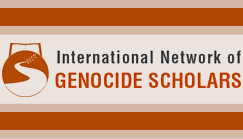Submission Type
Blog Post
Abstract
At the time of the Armenian Genocide, trained nurses from the US and Canada participated in the relief efforts organized by the American Red Cross and the Near East Relief. This paper examines the American Journal of Nursing, the Canadian Nurse and the Globe between 1915 to 1923 to explore how nurses viewed their roles in relief work. By analyzing reports, articles and testimonies published in these sources, this paper discusses whether nurses subscribed to the neutral ideology of humanitarianism, the interventionist definitions of modern humanitarianism, or both. The findings of this study highlight nurses’ perceptions on their accomplishments on both personal and professional levels through hospital work, public health nursing and teaching. Nurses recognized and reported on tragedies affecting the victims of the genocide, yet remained impartial by delivering care to Armenians, Turks, Greeks, Kurds and Jews alike. By establishing modern American style health care institutions and nursing schools, they visualized a future of inclusivity, diversity and peace. Their ambitions were met with many instances of disappointments when massacres forced the closure of hospitals and schools and led to the interruption of their services. The humanitarian relief efforts of the American Red Cross and the Near East Relief had an official neutral structure, yet nurses sometimes deviated from the mainstream neutral ideology by reporting on the stories of the Armenian victims of the genocide, calling for fundraising to help the survivors of the massacres, and vocally denouncing Turkish intentions and Western inaction.

Perceptions of Relief Nurses during the Armenian Genocide: Neutrality, Modern Humanitarianism and Future Aspirations
At the time of the Armenian Genocide, trained nurses from the US and Canada participated in the relief efforts organized by the American Red Cross and the Near East Relief. This paper examines the American Journal of Nursing, the Canadian Nurse and the Globe between 1915 to 1923 to explore how nurses viewed their roles in relief work. By analyzing reports, articles and testimonies published in these sources, this paper discusses whether nurses subscribed to the neutral ideology of humanitarianism, the interventionist definitions of modern humanitarianism, or both. The findings of this study highlight nurses’ perceptions on their accomplishments on both personal and professional levels through hospital work, public health nursing and teaching. Nurses recognized and reported on tragedies affecting the victims of the genocide, yet remained impartial by delivering care to Armenians, Turks, Greeks, Kurds and Jews alike. By establishing modern American style health care institutions and nursing schools, they visualized a future of inclusivity, diversity and peace. Their ambitions were met with many instances of disappointments when massacres forced the closure of hospitals and schools and led to the interruption of their services. The humanitarian relief efforts of the American Red Cross and the Near East Relief had an official neutral structure, yet nurses sometimes deviated from the mainstream neutral ideology by reporting on the stories of the Armenian victims of the genocide, calling for fundraising to help the survivors of the massacres, and vocally denouncing Turkish intentions and Western inaction.





Comments
View David Yacoubian's bio.